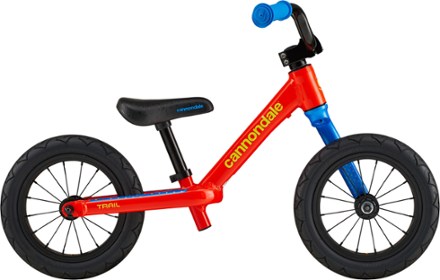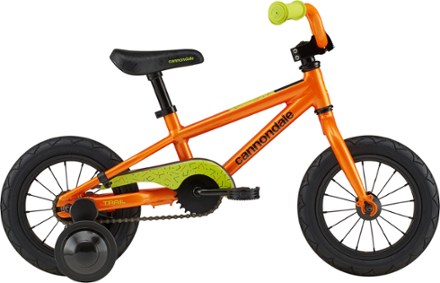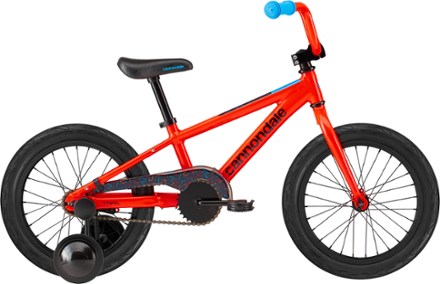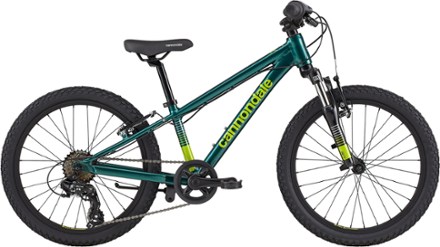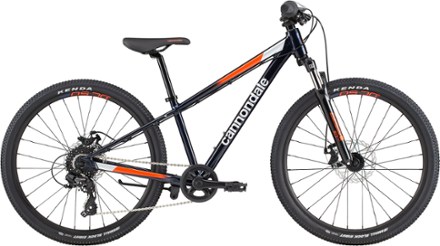Cannondale Trail Series Review — Affordable, Comfortable and Versatile

Cannondale’s ‘Trail’ series features 8 hardtail mountain bikes with varying degrees of quality, ranging in price from as little as $600 up to $2,200. Although relatively entry-level MTBs, the bikes are good value-for-money and, as the name suggests, are intended for light to medium trail riding.
The bikes all feature rugged alloy frames designed for durability and handling on low-impact MTB trails and gravel roads.
The more technical SE models have slacker head and seat tube angles, dropper seat posts, and 120mm of travel while the SL models are quicker and sportier with only 100mm of travel. All the frames feature Cannondale’s SAVE (Synapse Active Vibration Elimination) technology which reduces harsh backend vibrations.
The more affordable Trail 6, 7, and 8 models feature a double front chainring, while models 1-5 have only a single front cog. The higher range models also get straight shot internal cable routing with remote lockout air-sprung forks, while lower-cost models feature coil forks and only semi-internal routing.
Table of Contents
Cannondale – Trail 1
MSRP $1,850
- Fork: RockShox Reba RL 120mm
- 12-speed SRAM NX/SX Eagle drivetrain
- TranzX Dropper seat post
- Shimano MT500 hydraulic disc brakes 180/160mm RT30 rotors
- Integrated connectivity with Cannondale App
- Tires – WTB Breakout Comp, 27.5/29 x 2.3″, DNA Compound
- Weight: approx 31 lbs / 14.1 kg
The Trail series flagship MTB is an impressive piece of machinery, combining a decent mix of good quality gearing, brakes, and suspension. On the standard Trail 1 and SL, you get a RockShox Reba RL fork up front, while the pricier SE version boasts a RockShox 35 Gold RL fork. Both come with 120mm of travel while the Trail 1 SL has a reduced 100mm of travel.
For gearing on the Trail 1, Cannondale has included a 12-speed SRAM Eagle drivetrain that combines both NX and SX parts. This is paired with Shimano’s MT500 hydraulic disc brakes, locking onto WTB ST i29 rims wrapped in 2.3″ WTB Breakout Comp tires. Any MTB rider worth their salt will know how well this popular combination of tires and brakes works together.
The Trail 1 SE ramps up the quality a bit with Shimano 4-piston hydraulic disc brakes, ideal for downhill riding, while the SL version uses 2-piston Shimano MT400 brakes. However, the SL is the faster of the two bikes, with a slacker 68″ head angle designed for quick and agile riding.
All Trail 1 models feature TranzX dropper seat posts and integrated connectivity with the Cannondale app, so you can get all your stats directly on your smartphone. Weight-wise, the Trail 1 comes in at an average of 31 lbs (14.1kg), which is a fairly standard weight for an alloy MTB. Overall, it’s a very impressive bike for skilled recreational riders that appreciate good quality but don’t want to break the bank.
Trail 1 SL
100mm travel, MT400 hydraulic disc brakes, a faster bike with a 68′ head and angle
Trail 1 SE
120mm travel RockShox 35 Gold RL fork, SRAM NX/SX Eagle 12-speed drivetrain, Shimano 4-piston hydro disc brakes
Cannondale – Trail 2
MSRP $1,600
- Fork: RockShox Judy Gold RL 120mm fork
- 12-speed SRAM SX Eagle drivetrain
- Shimano MT400 Hydraulic Disc Brakes, 180/160mm RT30 rotors
- TranzX dropper seat post
- Truvativ Power Spline bottom bracket
The Trail 2 comes in just slightly cheaper than the Trail 1 but boasts a set of components almost equal in quality. Experienced riders may notice the minor technical changes on the RockShox Judy forks but the drivetrain and brakes are very similar. Again, the SL version has slightly less travel while the SE version gets an upgraded RockShox 35 Silver fork.
Both the standard and SE models feature a set of SRAM SX Eagle gears, while the SL model gets a Shimano drivetrain mixing top-quality SLX and Deore parts. Both are excellent drivetrains designed to tackle the roughest of mountain trails and rocky backroads. Braking on all versions of the Trail 2 is supplied by Shimano’s MT400 hydro disc brakes and like the Trail 1, they all enjoy a TranzX dropper seat post.
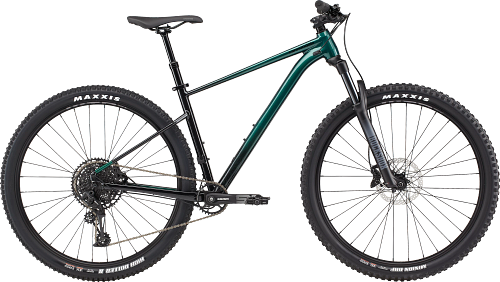
All the Trail 2 bikes feature WTB STX i23 rims and a selection of tires to suit the intended use. On the standard Trail 2, you get a pair of excellent WTB Breakout Comp tires, offering solid handling and decent grip in loose gravel or wet weather. On the SE version, we see a pairing of downhill-focused Maxxis tires: the Minion DHF up front and a High Roller on the back. Meanwhile, the speed-focused SL version gets two fast-rolling Schwalbe Rocket Ricks.
Another notable feature of the Trail 2 is the tough Truvativ Power Spline bottom bracket, which ensures smooth and hassle-free pedaling for many miles. A great feature of the Trail 2 is the variety of components between the three models, ensuring all-rounders, speed-freaks or downhill chargers get exactly what they need.
Trail 2 SL
RockShox Judy Gold RL 100mm fork, Shimano SLX/Deore 12-speed drivetrain / Shimano MT400 hydro disc brakes
Trail 2 SE
RockShox 35 Silver R 120mm fork, SRAM SX Eagle 12-speed drivetrain / Shimano MT400 hydro disc brakes
Cannondale – Trail 3
MSRP $1,300
- Fork: RockShox Judy Silver TK 120mm w/remote lockout
- 12-speed SRAM SX Eagle drivetrain
- Integrated connectivity with Cannondale App
- Shimano MT200 Hydraulic Disc Brakes
With the Trail 3, we again see some minor alterations that keep the price down without making large sacrifices to the ride quality. Cannondale has stuck with the ever-popular 12-speed SRAM SX Eagle drivetrain on the standard model and gone with Shimano’s Deore drivetrain on the SL and SE versions. Both gearsets are good quality and rare to see on a bike in this price range.
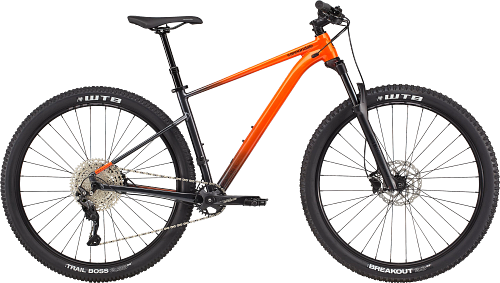
Some savings have been made by downgrading to Shimano MT200 hydraulic disc brakes but you’ll barely notice as these brakes still offer excellent stopping power in both wet and dry weather. This time around, we get RockShox Judy Silver TK forks with remote lockout as standard across all versions. As with all models, you get 120mm of travel on the SE and standard model and 100mm on the SL.
Cannondale has also stuck with the winning combination of WTB STX i23 rims and WTB Breakout tires on the standard and SE models, with Schwalbe Rocket Ricks on the SL. This means, wheel-wise, it comes out very similar to the Trail 2. Overall, this makes the Trail 3 one of the best value-for-money bikes in the Trail series. With a Premium SmartForm alloy frame, Cannondale app connectivity, and a Truvativ Powerspline bottom bracket, you get all the quality at a discounted price.
Trail 3 SL
RockShox Judy Silver TK 100mm fork with remote lockout Shimano Deore 12-speed
Trail 3 SE
RockShox Judy Silver TK 120mm fork Shimano Deore 11-speed shifting
Cannondale – Trail 4
MSRP $1,000
- Fork: RockShox XC30 TK 100mm w/ lockout
- 10-speed Shimano Deore drivetrain
- Shimano MT200 hydraulic disc brakes
- Sealed cartridge bottom bracket
Dropping into the $1,000 range, the Trail 4 features some significant changes from the 1, 2, and 3 in the series. Most notably, the 10-speed Shimano Deore drivetrain has been paired with a cost-saving Sunrace cassette on the standard model. While sufficient for its purpose, some experienced riders may feel this component is of a lower quality than the Shimano cassette on the SE and SL models.
Further cost savings can be found up front, where Cannondale has chosen SR Suntour XCR forks on the SE and SL versions of the Trail 4. These forks, which are known to be a bit on the heavy side, are commonly seen on low-cost entry-level MTBs. However, less experienced riders will not be deterred as the fork still offers adequate suspension and vibration dampening.
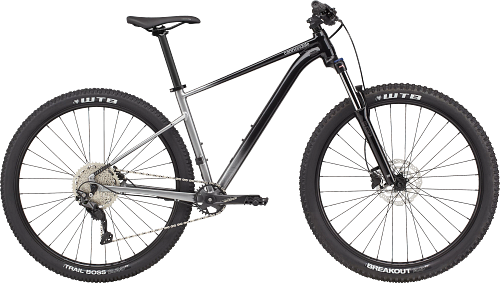
For tires, Cannondale has fitted the slightly thinner and fast-rolling Schwalbe Rocket Ricks on the SL which are a popular all-rounder but not quite as grippy as the WTB Breakouts. For those that prefer WTB tires, the SE version mixes a WTB Breakout on the front with a WTB Trail Boss on the back while the standard has WTB Ranger Comps. These again are fitted on strong WTB STX i23 rims on all versions, with braking supplied by Shimano MT200 hydraulic disc brakes on the standard and SL and Tektro disc brakes on the SE.
Overall, the Trail 4 is a decent entry-level mountain bike at a very affordable price. However, you may find the performance on this bike subpar if you’re an experienced MTB rider who enjoys tackling tough, technical trails.
Trail 4 SL
Premium SmartForm C2 Alloy frame / SR Suntour XCR-RL 100mm fork with remote lockout Shimano Deore 10-speed
Trail 4 SE
Premium SmartForm C2 Alloy frame / SR Suntour XCR 120mm fork with lockout Shimano Deore 10-speed shifting, Tektro hydraulic disc brakes
Cannondale – Trail 5
MSRP $750
- Fork: SR Suntour XCM, 100 mm travel, coil
- Light and durable SmartForm C3 Alloy frame
- 10-speed MicroShift Advent X drivetrain
- Shimano MT200 Hydraulic Disc brakes
- Cartridge, square taper bottom bracket
Moving into the budget options of the Trail series, the Trail 5 only comes in one model and combines some cheap components with a few decent parts. At times, the SR Suntour XCM fork can be a bit slow to respond but otherwise, it provides more than enough suspension for light riding, with 100mm of travel.
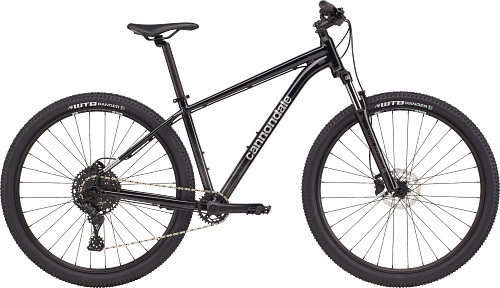
Some discerning cyclists may feel that the 10-speed MicroSHIFT drivetrain isn’t sufficient for intense MTB riding but it’s more than adequate for relaxed, recreational cycling. However, if you do want to hit high speeds on the Trail 5 you’ll feel confident with the grippy WTB Ranger Comp tires and Tektro M275 hydraulic disc brakes. The addition of these mid-range yet trusted components make the low price tag seem very attractive.
The lack of a trusted SRAM or Shimano drivetrain does bring down the overall value of the Trail 5 but other than that, it’s actually not bad for the price. If you just want a simple cheap MTB for the occasional weekend ride, it’s a great option.
Cannondale – Trail 6
MSRP $650
- Fork: SR Suntour XCT, 100mm, coil
- 16-speed Shimano Altus & Acera drivetrain
- Shimano MT200 Hydraulic Disc Brakes
- Shimano M315 Rapidfire Plus shifters
- Sealed bearing cartridge, square taper
With the Trail 6, you get a lot more gearing options due to the double chainring, which combines with an 8-speed cassette to provide 16 gears. This is great for beginner riders who are still working on building up their leg strength. The rather mixed-and-matched drivetrain makes use of decent Shimano Acera and Altus derailleurs paired with a lower quality Prowheel crank and Sunrace cassette.
For suspension, you get an SR Suntour XCT fork with 100mm of travel – an adequate enough component for the type of low-impact trail riding that this bike is intended for. Similarly, the Tektro hydraulic disc brakes are sufficient for purpose and work well but are not intended for high-speed, technical riding.
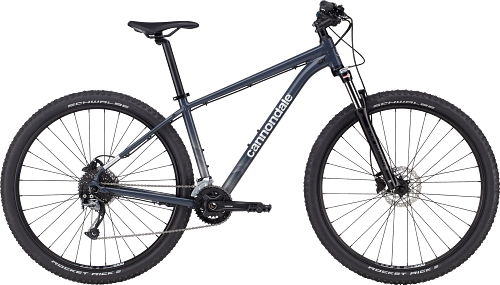
Cannondale has gone with the mid-range but popular WTB Ranger Comp tires on the Trail 6 supported by slightly heavy but strong WTB SX19 rims. You don’t get any tubeless compatibility or dropout hub options, but for basic riding, they’ll get the job done.
With some entry-level components like Shimano Rapidfire shifters, the Trail 6 is clearly a budget MTB for beginners and undemanding riders. It’ll tackle mild offroad conditions and gravel tracks with ease but I wouldn’t go charging down a mountain on it.
Cannondale – Trail 7
MSRP $560
- Fork: SR Suntour XCT DS 100mm, coil
- 16-speed Shimano Altus & Tourney Derailleurs
- Shimano MT200 Hydraulic Disc Brakes
- Sealed bearing cartridge, square taper
The Cannondale Trail 7 uses similar components to the 6 but with some slight cost-savings on the drivetrain. Upfront, you get the same budget SR Suntour XCT coil-sprung fork with 100mm of travel which provides just enough suspension for light riding. Braking power is once again supplied by Tektro’s M275 hydraulic disc brakes, a popular addition found on many affordable MTBs.
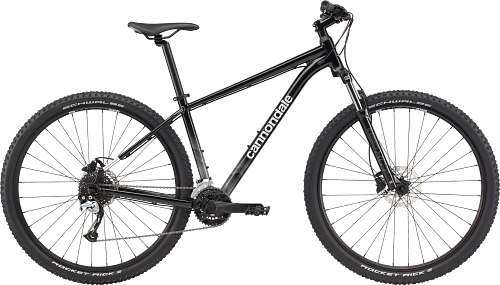
For the gears, we again see cost-savings in the form of a 16-speed microSHIFT drivetrain combined with an 8-speed Sunrace cassette and a double Prowheel crankset. Entry-level riders will probably be satisfied with this setup but it lacks the solid, dependability of higher-grade components.
Wheels are finished off once again with WTB SX19 rims paired with the decent although somewhat heavy WTB Ranger Comp tires. Overall, this is your typical budget MTB in the highly affordable $500 range but considering it’s a Cannondale, you get that extra level of trust and reliability.
Cannondale – Trail 8
MSRP $485
- Fork: SR Suntour M3030, 75mm, coil
- Shimano Altus & Tourney Derailleurs
- Tektro Mechanical Disc Brakes
- Sealed bearing cartridge, square taper
The Trail 8 is the most affordable and lowest quality bike in the series. It’s about 15% cheaper than the Trail 7 but features the same frame and wheelset along with a very similar drivetrain. So where do the savings come in?
Well, the most notable change is the move to cheap Tektro cable-actuated disc brakes, making this the only bike in the series that doesn’t use hydraulic disc brakes. Furthermore, the Trail 8 uses a budget SR Suntour M3030 coil fork with only 75mm of travel – enough to swallow up only the smallest of bumps and vibrations.
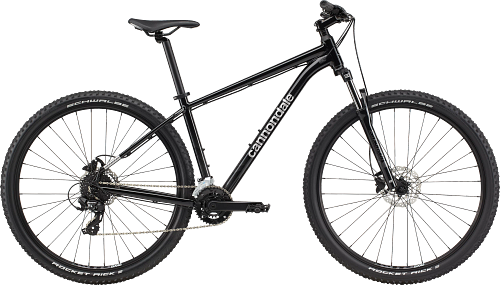
The microSHIFT drivetrain is very similar to the Trail 7 although paired with only a 7-speed Sunrace cassette, so you’re left with just 14 gears. They’re small changes but they set the Trail 8 apart from the rest in the series as a truly entry-level MTB.
Like many sub-$500 MTBs from leading manufacturers, the Trail 8 features a collection of cheap components built around a decent quality frame. It’ll probably last a bit longer than similarity-priced, lesser-known brands but in the end – you get what you pay for.
MEN’s Trail Size Chart
XS – 4’6″ – 5’2″ | 137 – 157cm – XS
SM – 5’1″ – 5’4″ | 154 – 162cm – SM
MD – 5’4″ – 5’8″ | 162 – 172cm – MD
LG – 5’7″ – 6’0″ | 170 – 182cm – LG
XL – 6’0″ – 6’3″ | 182 – 190cm – XL
WOMEN’s
The Cannondale Trail Women’s series feature some alterations designed to make the bikes more suitable to female riders. Cannondale’s Premium Smartform alloy frames with SAVE technology now include a dropped top tube for easier mounting and Women’s Ergo saddles.
Just like the standard versions, there are 8 different bikes in the Women’s series of varying quality and cost. However, they don’t all feature SL and SE options, rather combining certain features from both to create all-rounder bikes.
Trail 1 – Women’s
The Trail 1 Women’s is the leading bike in the series, featuring a high-quality Shimano SLX drivetrain with a 2×11 setup providing a total of 22 gears. This is paired with a set of Shimano MT200 hydraulic disc brakes, which are sufficient enough but a significant downgrade from the MT500’s on the standard Trail 1.
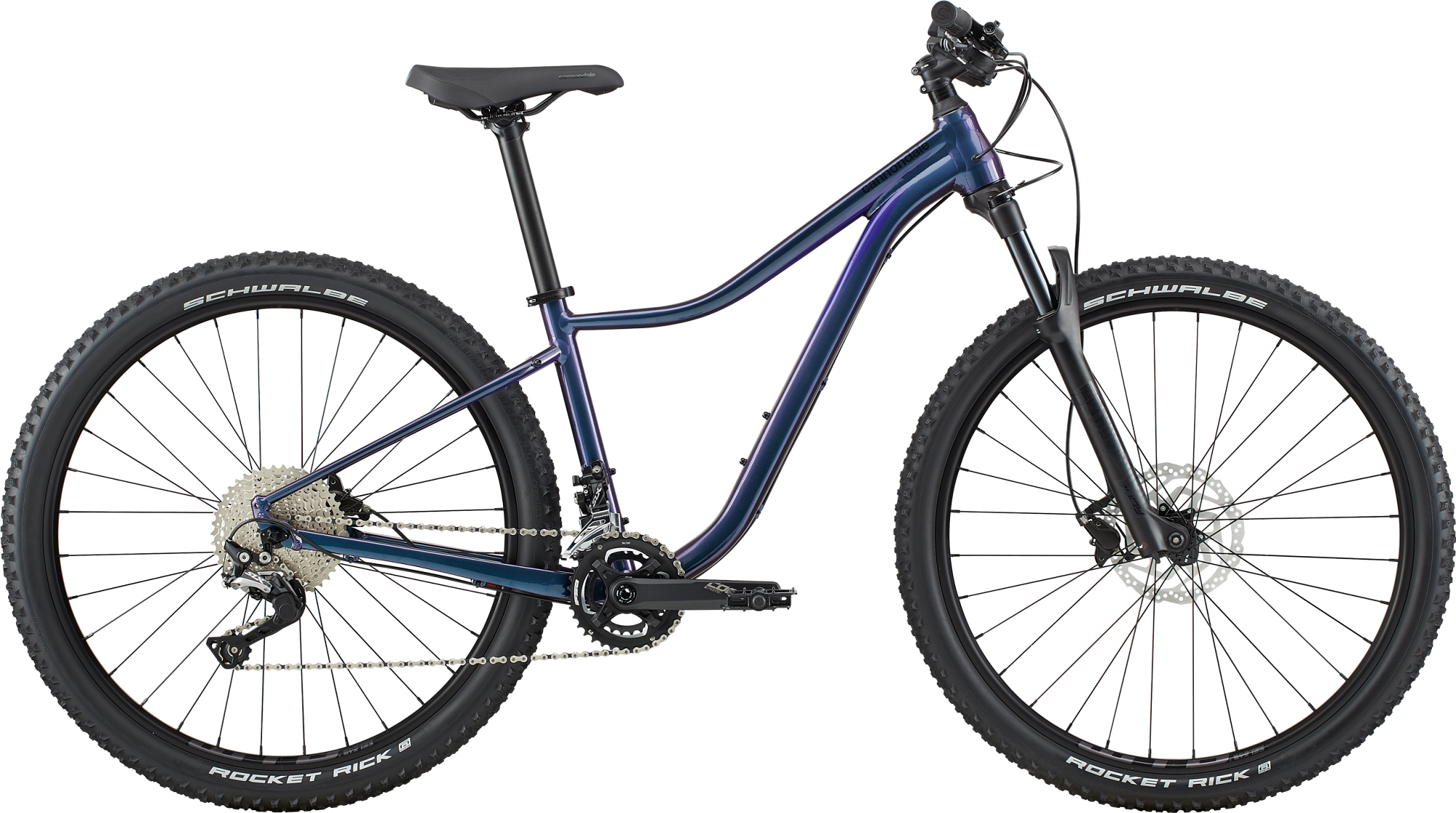
As with the other high-rated Trail bikes, you get WTB STX i23 rims combined with Schwalbe Rocket Rick tires – a popular choice on quality MTBs. Also included are the usual bells and whistles like a Truvativ Power Spline bottom brack, wheel sensor with app connectivity, and StriaghtShot internal cable routing.
Suspension on the Trail 1 Women’s also sees a minor change to a RockShox Judy Silver air-sprung fork with 120mm of travel. These parts make the Trail Women’s 1 most similar to Cannondale’s standard Trail 2 SL, although with a few female-focused tweaks. Overall, a very decent MTB but not quite to the same high-quality as the flagship Trail 1.
Trail 2 – Women’s
Although still built around the same Premium SmartForm C2 alloy frame with integrated routing and smartphone connectivity, the Trail 2 Women’s does reduce costs in some areas. The fork sees a mild downgraded to an air-sprung SR Suntour XCR with 100mm of suspension and remote lockout. It’s a decent component but not quite at the level of the RockShox fork on the Trail 1.
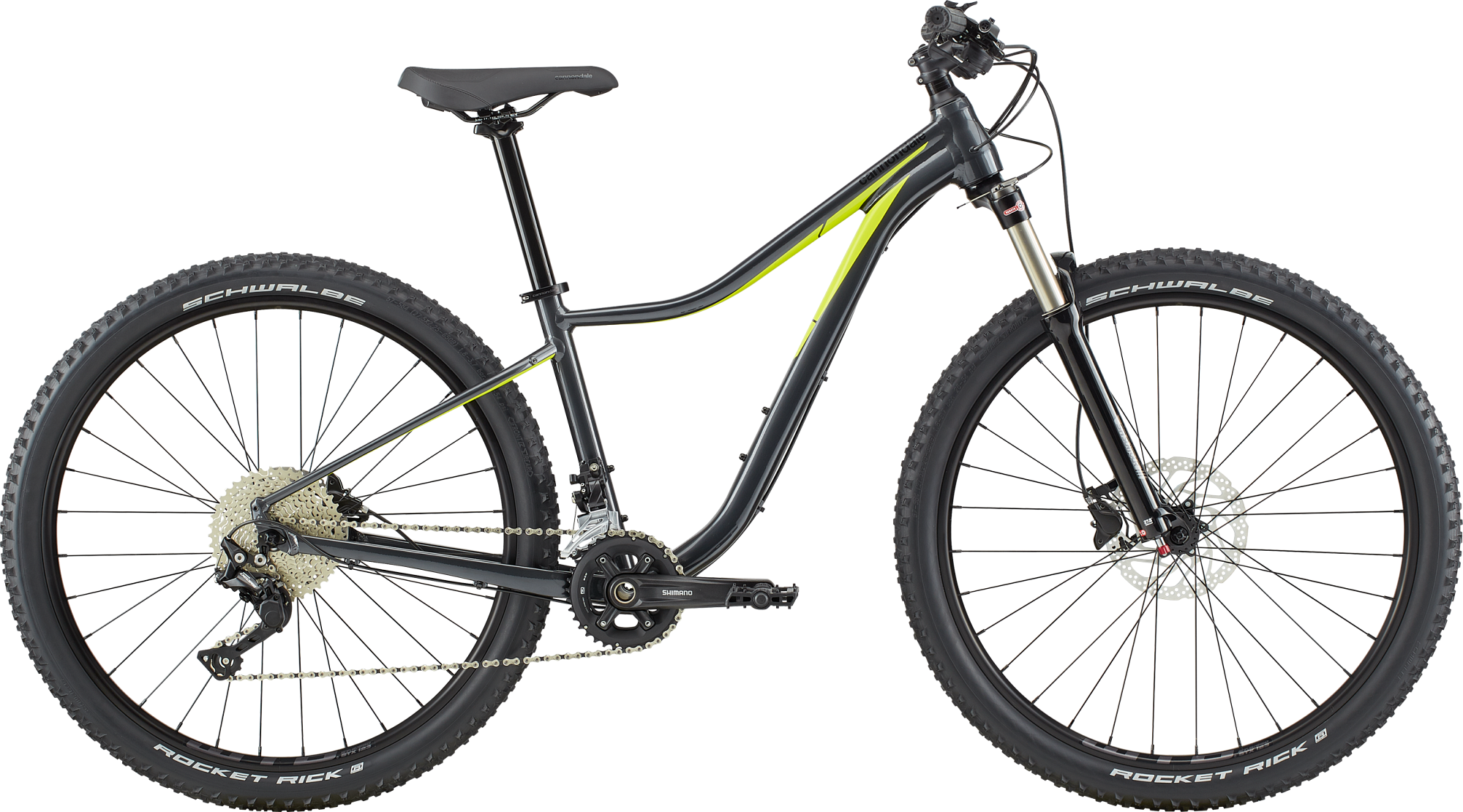
However, the 2×10 Shimano Deore drivetrain is certainly no minor addition to overlook, giving the rider up to 20 smooth and efficient gearing options. This is once again paired with a set of trusty Shimano MT200 hydraulic disc brakes for quick, solid stopping power in any weather conditions.
On the wheels, you get the same tubeless-ready WTB STX i23 rims wrapped in K-Guard puncture-resistant Schwalbe Rocket Rick tires.
Trail 3 – Women’s
The Cannondale Trail 3 Women’s offers very little difference from the 2, featuring a similar 2×10 Shimano Deore drivetrain with Sunrace cassette and ProWheel crank. The brakes are again Shimano MT200 hydraulic discs with Schwalbe Rocket Rick tires, although the wheels see a minor downgrade to heavier WTB SX19 rims.
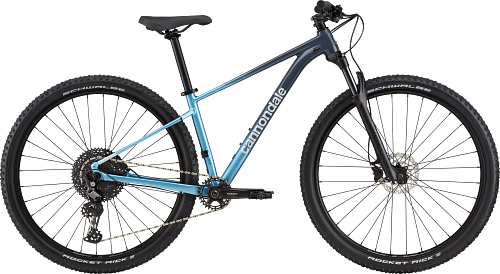
The suspension sees a minor change too, with a coil-sprung SR Suntour XCT32 fork. It’s an entry-level for but still boasts remote lockout and delivers an adequate 100mm of travel. Sure, it doesn’t quite have the response and smoothness of the Trail 2 but most riders will find it more than fit for purpose.
There are some other minor tweaks that help to keep costs down, like a C3 alloy frame and quick-release hubs, but overall the Trail 3 Women’s is a great bike for the price offering good value for money.
Trail 4 – Women’s SL
For the Trail 4 Women’s, Cannondale chose to include an SL model which significantly upgrades the component set from the 4. Most notably, you get a decent 2×11 Shimano Deore drivetrain and an air-sprung SR Suntour XCR-RL fork with remote lockout.
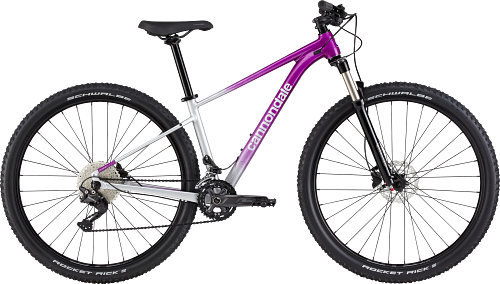
The wheels are also upgraded to WTB STX i23 rims, although the Schwalbe Rocket Rock tires and Shimano MT200 disc brakes remain the same. This popular combination has proven an excellent choice for Cannondale, featuring on several of its Trail bikes.
Overall, this makes the Trail 4 SL Women’s bike a better option than the Trail 3 Women’s, as it has more gears, lighter rims, and better suspension. Certainly one of the best value-for-money options to go for if you’re looking for a women’s bike in the Trail series.
Trail 4 – Women’s
On the Trail 4 Women’s MTB, Cannondale has continued the use of their SmartForm C3 alloy for the frame, utilizing StraightShot cable routing and SAVE technology. It once again uses another 100mm SR Suntour coil-sprung fork, this time the XCM-RL which has a cable-controlled lockout. Other than that, the performance isn’t noticeably different and should suffice for light riding.
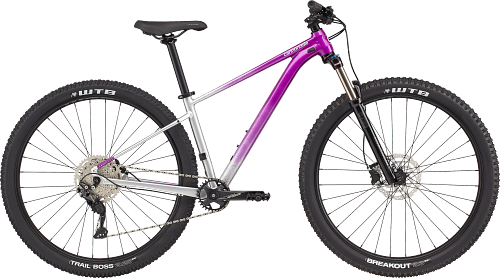
It also features heavy WTB SX19 rims fitted with Schwalbe Rocket Rick tires and supported by Shimano MT200 hydraulic disc brakes. For the 2×9 drivetrain, Cannondale has formulated a mixture of low-cost Shimano Acera, Alivio, and Altus components paired with a budget 9-speed Sunrace cassette. It’s not the best gearing setup we’ve tested but it works and provides the rider with a full 18 gears to choose from.
Trail 5 – Women’s
Coming in at just under $1,000, the Trail 5 is the first highly affordable bike in the Trail Women’s series. However, that doesn’t mean it’s completely budget as it still boasts some impressive features.
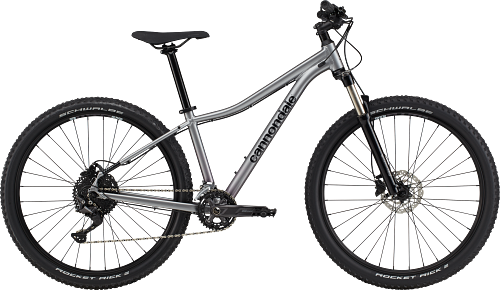
Keeping with Cannondale’s winning SmartForm C3 alloy frame, it incorporates a mid-range SR Suntour XCM fork with remote lockout and 100mm of travel. One slight downgrade is the drivetrain, which uses a somewhat low-cost microSHIFT Advent groupset running a 10-speed cassette off a single front crank. It’s functional for mild, flat terrain but has some limitations when faced with steep ascents or rough trails.
Cannondale has also cut costs with their popular mix of WTB SX19 rims and WTB Ranger Comp tires on the lower-cost Trail Women’s bikes. A bit heavy and not particularly fast-rolling, this wheel combination gets the job done but won’t win any races. Tektro’s M275 hydraulic disc brakes are also sufficient but any extras like dropper seat posts, tubeless-ready rims, or alternate dropout compatibility are not included.
Trail 6 – Women’s
As is common on Cannondale’s lower-cost Trail bikes, the Women’s 6 drivetrain features a mix of Shimano Altus and Acera components running an 8-speed Sunrace cassette. The Prowheel double crank means you get a full 16 gears, making this a good option for riders that struggle on hills.
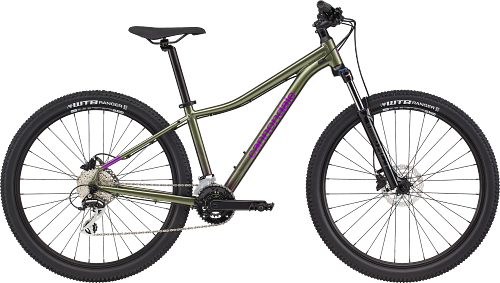
The rest of the components remain relatively similar to previous versions, including the C3 alloy frame, Tektro M275 hydraulic disc brakes, and WTB SX19 rims with Ranger Comp tires. The suspension comes from a coil-sprung SR Suntour XCT fork with 100mm of travel – a decent component that makes the Trail 6 Women’s almost equal in quality to the Trail 5.
Some riders may prefer the 1×10 setup on the Trail 5 but otherwise, there’s little difference between these two bikes – making the Trail 6 better value for money.
Trail 7 – Women’s
At first glance, the Trail 7 Women’s MTB appears to be an almost exact copy of the Trail 5 Women’s bike, but there are some minor differences. Firstly, the fork has been downgraded to a very basic and heavy coil-sprung SR Suntour XCT-DS. While it provides 100mm of travel, it’s a bit clunky and lacks adjustability.
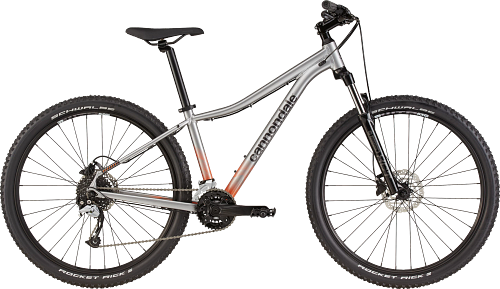
Secondly, while the Trail 7 also comes with microSHIFT gears, it uses a double crank driving an 8-speed Sunrace cassette. Personally, I find this setup preferable, and considering the wheelset and brakes are the same, the cost-saving certainly seems worthwhile.
Trail 8 – Women’s
As with the cheapest option in the standard Trail series, the Trail 8 Women’s MTB features cable-actuated disc brakes and an SR Suntour M3030 fork. This basic fork only comes with 75mm of travel and isn’t really sufficient for real trail riding, absorbing only small bumps.
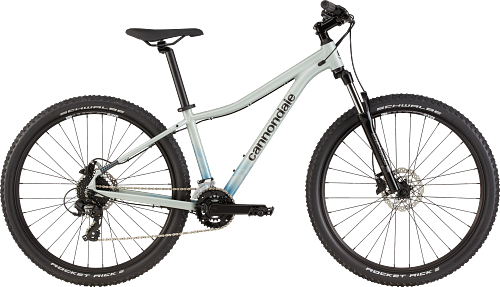
Other than those small tweaks, the bike features the same SmartForm C3 alloy frame, WTB wheelset, and a 2×7 microSHIFT drivetrain. If you can afford the extra $100, it’s definitely worth it for the improved suspension and braking but if not, this is your best budget women’s option in the Trail series.
KIDS’
For the little ones, Cannondale has also released several Trail bikes for kids, covering ages from as young as 1 years old to as old as 12.
Kids Trail Balance Bike
MSRP $210
Kids Trail 12
MSRP: $260
The smallest of the Kids Trail bikes, this miniature machine consists of 12″ wheels on a SmartForm C2 Alloy frame. It has a simple fixed-gear drivetrain and a coaster brake, so riders can easily stop by pushing back on the pedals.
This tiny bike is the perfect beginner bike for kids from 1 to 4 years old, available in colorful boy and girl models. It weighs only 15lbs (6.8 kg) and comes fully equipped with tool-less, removable training wheels.
Kids Trail 16 (Single-speed and Freewheel)
MSRP $280
The Kids Trail 16 is a minor upgrade to the 12, ideal for kids of 4 to 6 years old. The main difference is the slightly larger frame and 16″ wheels but you also get to choose a freewheel version.
With the Trail Freewheel 16, the fixed-gear rear hub is swapped out for a freewheeling hub – so the bike keeps rolling without the pedals. This is best for children who have learned to balance well and can safely roll at speed.
It also means your child no longer gets a coaster foot brake but rather V-brakes controlled by normal handlebar levers. This is a great way to learn the basics of stopping with both front and rear brakes.
Weighing approximately 19.6lbs (8.9kg), it comes in both girl and boy models with tool-less, removable training wheels included.
Kids Trail 20
The Kids Trail 20 is a significant upgrade from the 16″ model, featuring a full set of gears, suspension, and handlebar brakes. Young children with some cycling experience will enjoy learning new skills on this upgraded bike.
The SmartForm C2 alloy frame runs 20″ wheels and is fitted with an SR Suntour XCT-JR fork with 40mm of travel. The basic, coil-sprung fork is the perfect introduction to proper mountain biking with suspension.
For gearing, your child gets a classy 7-speed Shimano Tourney drivetrain with simple Revo Twist shifters, making gear changes a breeze. Promax Alloy V-brakes sort out the stopping, with linear-pull handlebar levers.
The Trail 20 weighs approximately 20.4lbs (9.2kg) and is available in two models for girls and boys.
Kids Trail 24
MSRP $525
The Trail 24 is essentially your child’s first real MTB, suited to kids of 7 to 12 years old. It features near-full-size 24″ wheels on a SmartForm C2 alloy frame with 1.95″ Kenda Small Block tires. The coil-sprung SR Suntour XCT fork provides 63mm of travel, giving your child a true feel for how front suspension works.
Pedaling power comes from a 1×8 Shimano Tourney drivetrain, with a Prowheel crank running an 8-speed Sunrace cassette. You even get proper MTB-style disc brakes, making this a true young adult MTB rather than just a kid’s bike.
Get them started on this excellent introductory bike and they’ll be tearing up the mountain trails in no time!
Cannondale Trail Series Comparison
Cannondale Trail
Head tube angle: 68º
Seat tube angle: 73.5º
Chainstays: 435mm
Without a dropper seat post
Cannondale Trail SE
Head tube angle: 66.5º
Seat tube angle: 72.6º
Chainstay length: 435mm
Dropper seat post
Cannondale Trail SL
Head tube angle: 68º
Seat tube angle: 75º
Chainstays: 435mm
Dropper seat post
Cannondale Trail SL vs Trail SE
SL – Quicker, sportier – 100mm travel
SE – More durable, robust 120mm travel
Trail 1-3
Designed for – Handling, durability
Best in – Low-impact trails, gravel roads, leisurely rides
- Integrated connectivity with Cannondale App
- Stem: Cannondale 3 with Intellimount
- Saddle: Cannondale Stage 3
- Fork type: Air
- Bottom bracket: Truvativ Power Spline
Trail 1-4
- Fork type: With a remote lockout
- Frame: Light and durable SmartForm C2 Alloy
- Straight-shot Internal Cable Routing
Trail 1-5
- Single front cog
Trail 4-8
- Fork type: Coil
Trail 5-8
- Frame: Light and durable SmartForm C3 Alloy
- Semi-Internal cable routing
Trail 6-8
- Double front chainring
Where to Buy Cannondale Trail Bikes?
Buy on REI.com Buy on GravityCoalition.com

